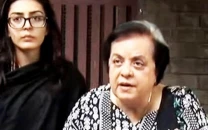Justice Isa’s ruling: Counsel recuses himself from representing MoI
Makhdoom Ali Khan writes letter to interior secretary that he cannot plead the Quetta incident case

Senior provincial law official says commission will submit its fact finding report before a three-judge SC bench. PHOTO: ONLINE
The judgment is authored by Supreme Court Justice Qazi Faez Isa, who also compiled the Quetta Inquiry Commission (QIC) report after an investigation into the August 8, 2016 suicide attack that left dozens of lawyers dead.
Makhdoom has written a letter to the interior secretary that he could not plead the Quetta incident case.
“There will be no bill for my professional fee. My associate counsel will also not be appearing in this case and will not [submit a] bill either,” said the letter, a copy of which is available with The Express Tribune.
He told the interior secretary that expenses already incurred by him for attending the case were also waived, adding that all work done so far might be regarded as ‘pro bono’.
The letter said the SC’s recent judgment had interpreted Articles 100 and 140 of the Constitution and it was the requirement of law that no court might proceed to substantial question without giving notice to the Attorney General or Advocate Generals. No such notice was issued in this case.
“Insofar as I am concerned I must abide by the judgment. It is, therefore, not possible for me to continue to appear for the MoI in the title case, ie, objections filed by MoI to the Quetta Inquiry Commission Report of Mr Justice Qazi Faez Isa. I accordingly recuse myself,” said the letter.
Meanwhile, the same counsel also recused himself from appearing on behalf of the Sindh government for defending the CM’s advisers’ appointments.
When Makhdoom stood up to argue case of the provincial government challenging the judgment of the SHC against appointment of advisers, he directed attention of the three-judge bench – headed by Chief Justice – to Justice Isa’s order regarding ban on private counsels.
The counsel said while the judgment was flawed he would not like to go into that issue. He deprecated the ‘selective approach’ adopted in the judgment. He said while the judgment had targeted litigators it had conspicuously omitted to mention transactional lawyers.
“This cannot be coincidental. Billions of rupees worth of government contracts were handled by private counsels but nothing was said about it. Makhdoom quoted from the dissent of Roberts J in Smith vs Allwright – a decision of the US Supreme Court that judgments should not be written like “restricted railroad tickets. Good for this day and train only.”
The bench however observed that was not the intention of the judgment. But Makhdoom submitted that till such time the intention to the contrary was made explicit through another judgment it would not be proper for him to represent Sindh.
Upon this, chief justice observed that if the provincial government obtained a certificate then perhaps Makhdoom could appear. He responded that he did not want to be embroiled in any such controversy.
Published in The Express Tribune, February 10th, 2017.



















COMMENTS
Comments are moderated and generally will be posted if they are on-topic and not abusive.
For more information, please see our Comments FAQ